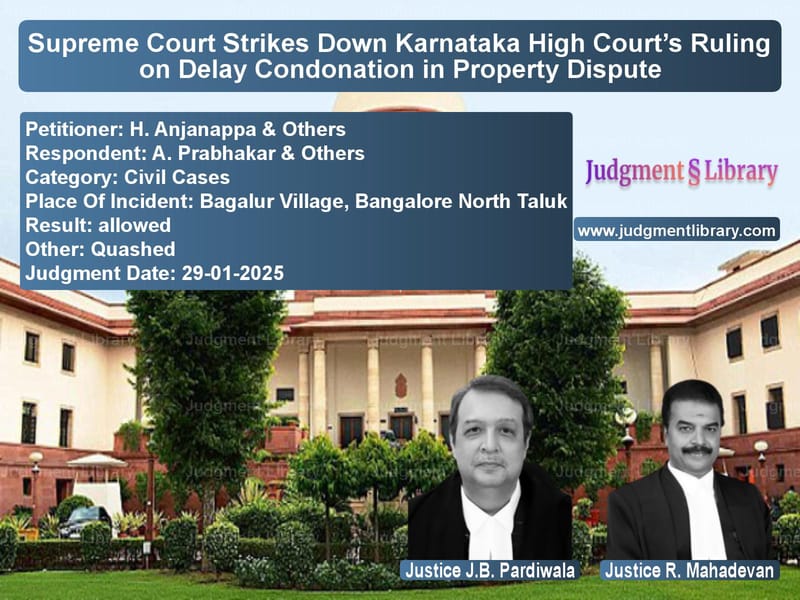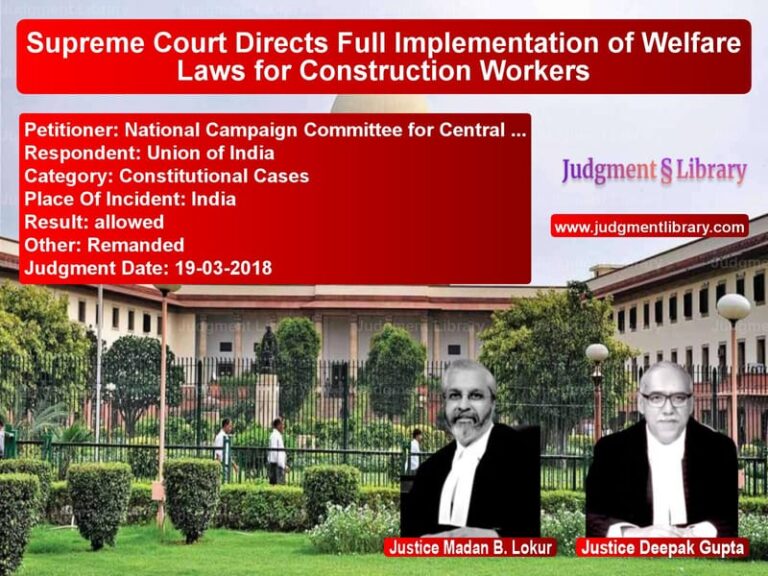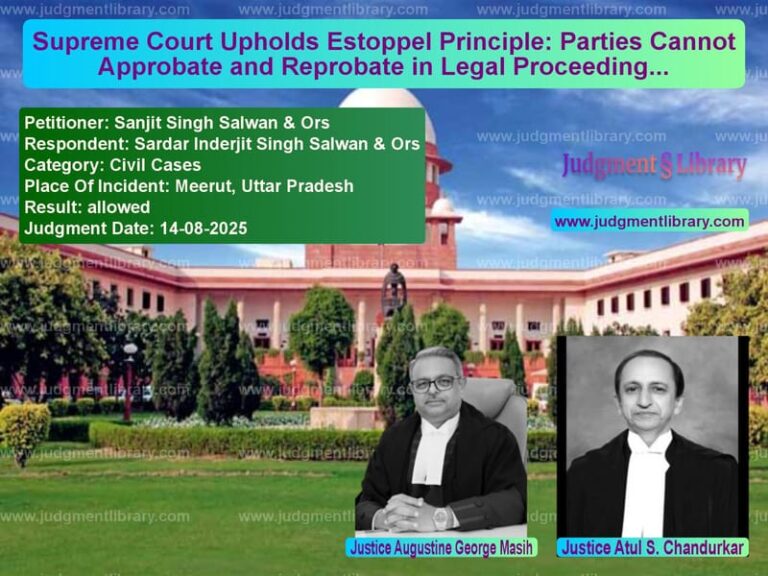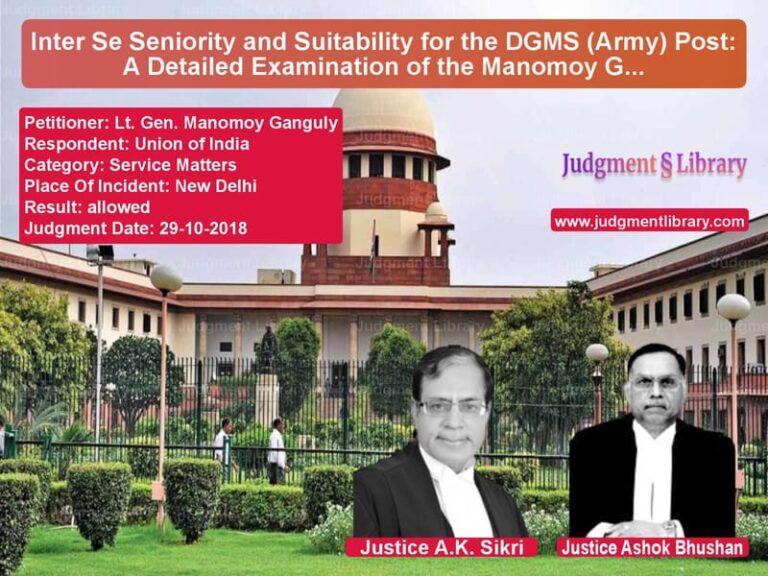Supreme Court Strikes Down Karnataka High Court’s Ruling on Delay Condonation in Property Dispute
The Supreme Court of India has set aside the Karnataka High Court’s order that had condoned a delay of 586 days in filing an appeal in a property dispute case. The ruling, delivered in the case of H. Anjanappa & Others v. A. Prabhakar & Others, dealt with critical issues related to specific performance of contracts, transfer of property during litigation (lis pendens), and the rights of subsequent purchasers in disputed properties.
The case involved a legal battle over land in Bagalur Village, Bangalore North Taluk, where the plaintiffs sought specific performance of an agreement to sell executed in their favor in 1995. However, during the litigation, a portion of the disputed land was sold to third parties, leading to multiple legal challenges.
Background of the Case
The dispute centered around land measuring 42 acres, originally owned by Late Smt. Daisy Shanthappa. The plaintiffs entered into a sale agreement with her in 1995 for Rs. 20,00,000, paying an advance of Rs. 15,00,000. However, the land was later sold to a third party, despite a pending suit seeking specific performance.
When the plaintiffs became aware of the unauthorized sale, they sought an injunction, which was granted in 2003, restraining further alienation of the property. Despite this, a portion of the land was sold in violation of the court order. The subsequent purchasers later sought to challenge the judgment granting specific performance in favor of the plaintiffs, leading to the Karnataka High Court’s ruling that condoned their delayed appeal.
Key Legal Issues
- Whether the Karnataka High Court erred in condoning a 586-day delay in filing an appeal.
- Whether a transferee pendente lite (someone who purchases property during pending litigation) has the right to challenge a decree for specific performance.
- The applicability of the doctrine of lis pendens under Section 52 of the Transfer of Property Act, 1882.
- The implications of collusion between original parties and subsequent purchasers.
Arguments of the Parties
Petitioners’ Arguments (Plaintiffs)
The plaintiffs, represented by Senior Advocate Mr. Anand Sanjay M. Nuli, argued:
- The Karnataka High Court erred in allowing the appeal of subsequent purchasers who had bought the property in violation of a judicial injunction.
- The subsequent purchasers had attempted to intervene in the original suit, but their application was rejected. Since they did not challenge that rejection, they could not now be allowed to appeal.
- The delay of 586 days in filing an appeal was unjustifiable and demonstrated a lack of due diligence on the part of the subsequent purchasers.
Respondents’ Arguments (Subsequent Purchasers)
The respondents, represented by Senior Advocate Mr. Gautam Narayan, countered:
- They were unaware of the litigation and were misled by their vendor.
- They were senior citizens residing in Scotland and had trusted the vendor to defend their interests.
- The delay should be condoned because they had a substantial stake in the property.
- The High Court had correctly allowed them to appeal in the interest of justice.
Supreme Court’s Observations
The Supreme Court analyzed the legal principles governing delay condonation, leave to appeal by non-parties, and the impact of lis pendens. The Court stated:
“The High Court committed an egregious error in condoning the delay of 586 days in filing the regular first appeal on mere asking. We are not convinced with the sufficient cause assigned by the respondents for the delay.”
Read also: https://judgmentlibrary.com/supreme-court-upholds-possession-rights-in-karnataka-property-dispute/
The Court emphasized that a transferee pendente lite must act with due diligence and cannot claim ignorance of pending litigation.
Final Judgment and Directions
The Supreme Court ruled:
- The High Court’s order condoning the delay was set aside.
- The appeal by the subsequent purchasers was dismissed.
- If the subsequent purchasers believed they were defrauded by their vendor, they were free to pursue civil remedies against the seller but could not challenge the specific performance decree.
Impact of the Judgment
This ruling reinforces the doctrine of lis pendens, ensuring that third parties cannot disrupt judicial proceedings by acquiring disputed properties. It also establishes a high threshold for condoning delays in appellate filings, particularly when the appellants have knowingly purchased property subject to ongoing litigation.
Conclusion
The Supreme Court’s decision is a landmark ruling that upholds the sanctity of specific performance decrees and prevents misuse of appellate jurisdiction by subsequent purchasers attempting to delay execution of judgments. It serves as a strong precedent against the unauthorized transfer of property during litigation and ensures judicial efficiency in property disputes.
Petitioner Name: H. Anjanappa & Others.Respondent Name: A. Prabhakar & Others.Judgment By: Justice J.B. Pardiwala, Justice R. Mahadevan.Place Of Incident: Bagalur Village, Bangalore North Taluk.Judgment Date: 29-01-2025.
Don’t miss out on the full details! Download the complete judgment in PDF format below and gain valuable insights instantly!
Download Judgment: h.-anjanappa-&-other-vs-a.-prabhakar-&-other-supreme-court-of-india-judgment-dated-29-01-2025.pdf
Directly Download Judgment: Directly download this Judgment
See all petitions in Property Disputes
See all petitions in Specific Performance
See all petitions in Contract Disputes
See all petitions in Damages and Compensation
See all petitions in Judgment by J.B. Pardiwala
See all petitions in Judgment by R. Mahadevan
See all petitions in allowed
See all petitions in Quashed
See all petitions in supreme court of India judgments January 2025
See all petitions in 2025 judgments
See all posts in Civil Cases Category
See all allowed petitions in Civil Cases Category
See all Dismissed petitions in Civil Cases Category
See all partially allowed petitions in Civil Cases Category







